In today's data-driven world, hiring a machine learning engineer can significantly enhance your company's ability to analyze complex datasets and make informed decisions. However, many recruiters struggle with identifying the right skills and qualifications necessary for this specialized role. A common misconception is equating machine learning engineers with data scientists or software engineers, without recognizing their unique blend of skills in AI and data processing.
This article will guide you through the process of hiring a machine learning engineer, from understanding their role to evaluating their qualifications and conducting effective interviews. We'll also highlight how to utilize pre-employment tests, like those offered by Adaface's machine learning online test, to ensure you select the best candidate for your needs.
Table of contents
Why Hire a Machine Learning Engineer?
To determine if you need a Machine Learning Engineer, start by identifying specific business problems they could solve. For example, you might want to improve customer retention rates or optimize your supply chain operations.
Consider starting with simpler use cases to test the waters:
- Implementing a recommendation system for your e-commerce platform
- Developing a predictive maintenance model for manufacturing equipment
- Creating a chatbot to handle basic customer inquiries
If you're unsure about committing to a full-time hire, consider working with a consultant or service provider initially. As your ML needs grow and become more complex, you can then transition to building an in-house team, starting with a Machine Learning Engineer.
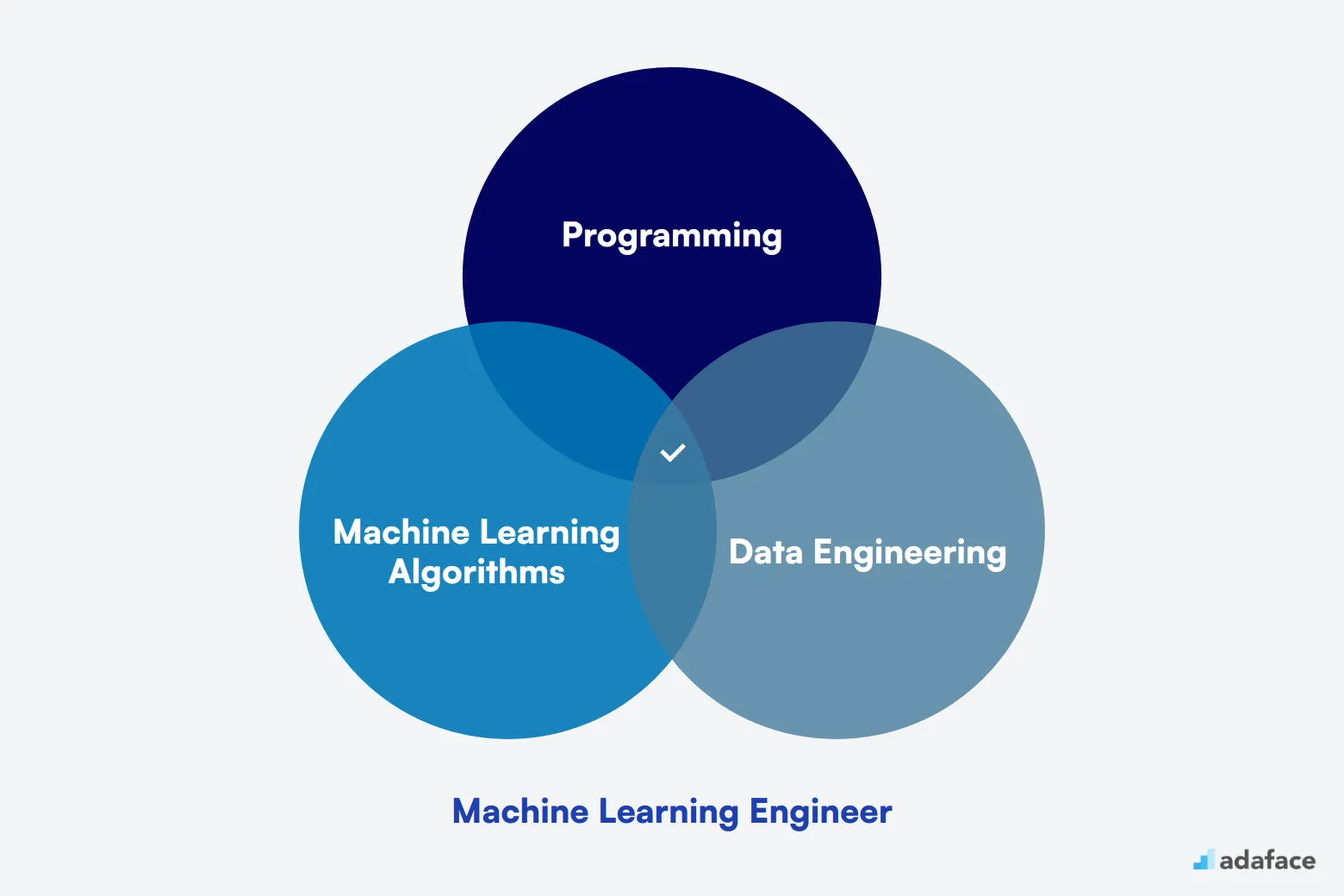
What does a Machine Learning Engineer do?
A Machine Learning Engineer is responsible for designing and implementing machine learning models to solve business challenges. They work at the intersection of software engineering and data science, transforming huge datasets into actionable intelligence.
Day-to-day tasks of a Machine Learning Engineer include:
- Data preprocessing: Cleaning and transforming raw data to a usable format.
- Model development: Choosing the right algorithms and frameworks to build predictive models.
- Model deployment: Integrating models into existing systems for practical use.
- Performance monitoring: Continuously evaluating model accuracy and updating as necessary.
For more detailed interview preparation, check out our Machine Learning Engineer interview questions.
Skills and Qualifications to Look for in a Machine Learning Engineer
Creating the ideal candidate profile for a Machine Learning Engineer can be tricky. The role requires a mix of technical and analytical skills that might vary greatly depending on your company's specific needs. It's important to draw a clear line between what's required and what's preferred for your organization to ensure you're targeting the right talent.
The required skills often include a Bachelor's degree in Computer Science, proficiency in Python, and experience with machine learning frameworks like TensorFlow. On the other hand, preferred qualifications might encompass a Master's degree in Machine Learning and experience with cloud platforms like AWS. You can explore more on the online assessment platform to evaluate these skills in potential candidates.
| Required skills and qualifications | Preferred skills and qualifications |
|---|---|
| Bachelor's degree in Computer Science, Engineering, or related field | Master's or PhD in Machine Learning, Data Science, or related field |
| Experience with machine learning frameworks such as TensorFlow or PyTorch | Experience with cloud platforms such as AWS, GCP, or Azure |
| Proficiency in programming languages like Python or R | Experience in deploying machine learning models in production environments |
| Strong understanding of machine learning algorithms and their applications | Familiarity with big data tools like Hadoop or Spark |
| Experience with data preprocessing and data wrangling techniques | Knowledge of deep learning architectures and natural language processing |
How to Write an Effective Machine Learning Engineer Job Description
Once you've defined the ideal candidate profile for your Machine Learning Engineer role, the next step is crafting a compelling job description to attract top talent. Here are some key tips to make your Machine Learning Engineer job description stand out:
- Highlight specific ML projects and technologies: Mention the types of machine learning models, frameworks, and tools the candidate will work with. This helps attract engineers with relevant experience.
- Balance technical skills with domain knowledge: Besides programming languages and ML algorithms, emphasize any industry-specific expertise or business acumen required.
- Showcase growth opportunities: Outline potential for career advancement, ongoing learning, and exposure to cutting-edge ML applications to appeal to ambitious candidates.
- Include collaborative aspects: Emphasize teamwork with data scientists, software engineers, and business stakeholders to attract well-rounded ML professionals.
10 Platforms to Hire Machine Learning Engineers
Now that you've crafted a detailed job description for a Machine Learning Engineer, it's time to present it on job listing platforms to attract suitable candidates. Leveraging the right platforms can help you tap into a diverse pool of talent, whether you're looking for full-time employees, freelancers, or remote workers.
LinkedIn Talent Solutions
Ideal for finding full-time ML engineers due to its vast network of professionals and robust search tools.

Indeed
A comprehensive platform for listing job descriptions, great for reaching a large pool of candidates for full-time positions.

Upwork
Best for hiring freelance ML engineers for short-term projects or flexible work arrangements.

Beyond the initial few platforms, various other options exist to help you find the right Machine Learning Engineer for your team. Platforms like AngelList are tailored for startups, while FlexJobs specializes in remote positions. HackerRank is excellent for conducting technical assessments, and Glassdoor allows you to showcase your company culture alongside job listings. For highly specialized roles, Kaggle Jobs attracts professionals with a strong data science background. Additionally, SimplyHired offers a broad search engine for finding full-time engineers across industries. If you're expanding into different hiring strategies, explore online assessment platforms to evaluate technical expertise efficiently.
How to Screen Machine Learning Engineer Resumes?
Resume screening is a key step in narrowing down candidates for a Machine Learning Engineer role. Given the high volume of applications, it's impossible to interview everyone. Effective screening helps identify potential fits early on, saving time and resources.
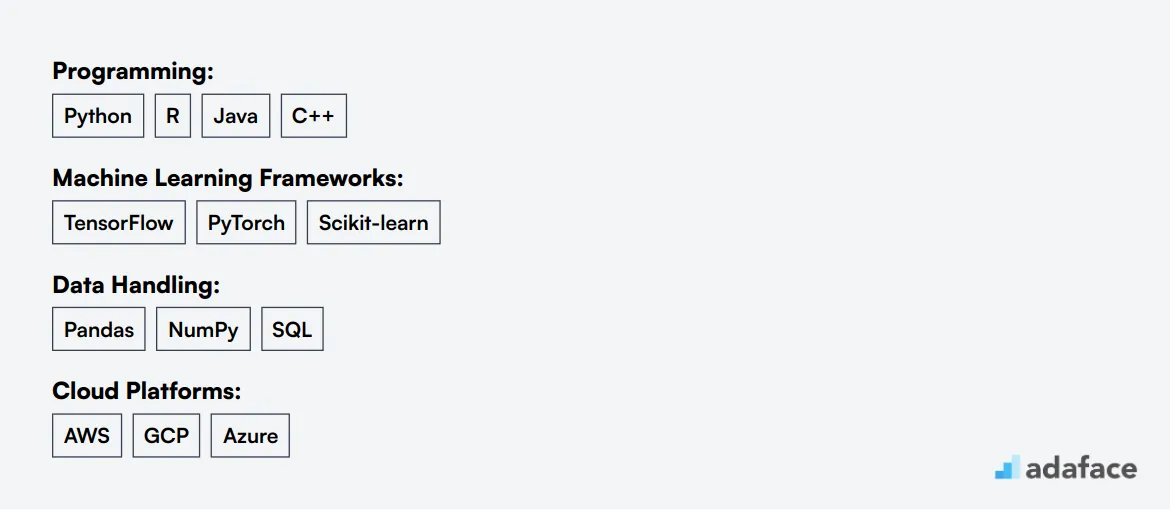
Manually screening resumes involves looking for keywords that highlight a candidate's skills and qualifications. Focus on terms like Python or R, TensorFlow or PyTorch, and experience with data preprocessing or data wrangling techniques. Additionally, check for educational qualifications like a bachelor's degree in Computer Science or related fields.
Using AI-powered tools can further streamline the resume screening process. Tools like ChatGPT can assist by identifying resumes that align with your requirements. Simply input your keyword criteria, and let the tool filter through resumes, enhancing the efficiency of your hiring process.
Here’s a prompt to help you utilize AI screening tools effectively:
TASK: Screen resumes for Machine Learning Engineer role
INPUT: Resumes
OUTPUT: For each resume, provide the following information:
- Email id
- Name
- Matching keywords
- Score (out of 10 based on keywords matched)
- Recommendation (whether to shortlist this candidate or not)
- Shortlist (Yes, No, or Maybe)
RULES:
- If unsure about a candidate's fit, rate them as Maybe
- Keep recommendations concise.
KEYWORDS DATA:
- Programming: Python, R
- Frameworks: TensorFlow, PyTorch
- Skills: Data preprocessing, Data wrangling
Recommended skills tests for Machine Learning Engineers
Skills tests are a reliable way to evaluate Machine Learning Engineer candidates beyond their resumes. They provide objective insights into a candidate's technical abilities and problem-solving skills. Here are five key tests we recommend for assessing Machine Learning Engineers:
Machine Learning Test: This Machine Learning test evaluates a candidate's understanding of core ML concepts, algorithms, and their practical application. It helps gauge their ability to develop and implement machine learning models.
Python Test: Python is a primary language for ML development. A Python skills assessment checks a candidate's proficiency in writing efficient code, data manipulation, and implementing ML algorithms.
Data Structures Test: Strong knowledge of data structures is essential for optimizing ML algorithms. This test assesses a candidate's ability to choose and implement appropriate data structures for ML tasks.
Deep Learning Test: For roles involving neural networks, a Deep Learning test is valuable. It evaluates understanding of neural network architectures, training processes, and frameworks like TensorFlow or PyTorch.
SQL Test: Machine Learning Engineers often work with large datasets. An SQL test assesses their ability to efficiently query and manipulate data, which is crucial for data preparation and feature engineering in ML projects.
Structuring Technical Interviews for Machine Learning Engineers
After candidates pass the initial skills tests, it's time for technical interviews to assess their hard skills in-depth. While tests are great for initial screening, interviews help identify the best-fit candidates for the role. Let's explore some key questions to ask during these interviews.
Consider asking: 1) 'Explain the difference between supervised and unsupervised learning.' 2) 'How would you handle imbalanced datasets?' 3) 'What's your approach to feature selection?' 4) 'Describe a challenging ML project you've worked on.' 5) 'How do you evaluate model performance?' These questions help gauge the candidate's understanding of ML concepts, problem-solving skills, and real-world experience.
How much does it cost to hire a Machine Learning Engineer?
Hiring a Machine Learning Engineer can vary significantly based on location and experience. In the United States, salaries typically range from $101,376 to $257,148, with a median of $161,458. India offers a wide range too, with salaries between ₹4,75,205 and ₹19,00,412 annually, and a median of approximately ₹9,50,308. In Australia, you can expect to pay between AUD 86,470 and AUD 213,736, with an average salary of AUD 144,690. Meanwhile, Canada sees salaries from CAD 72,028 to CAD 189,834, with a median of CAD 116,933. The cost is largely influenced by factors like the engineer's experience, skills, and the hiring location.
Machine Learning Engineer Salary in the United States
Machine Learning Engineers in the United States earn competitive salaries. According to recent data, the average salary ranges from $101,376 to $257,148, with a median of $161,458.
Top-paying cities for ML Engineers include San Francisco, Mountain View, and New York, where salaries can exceed $280,000 for experienced professionals. Factors like experience, skills, and company size significantly impact compensation.
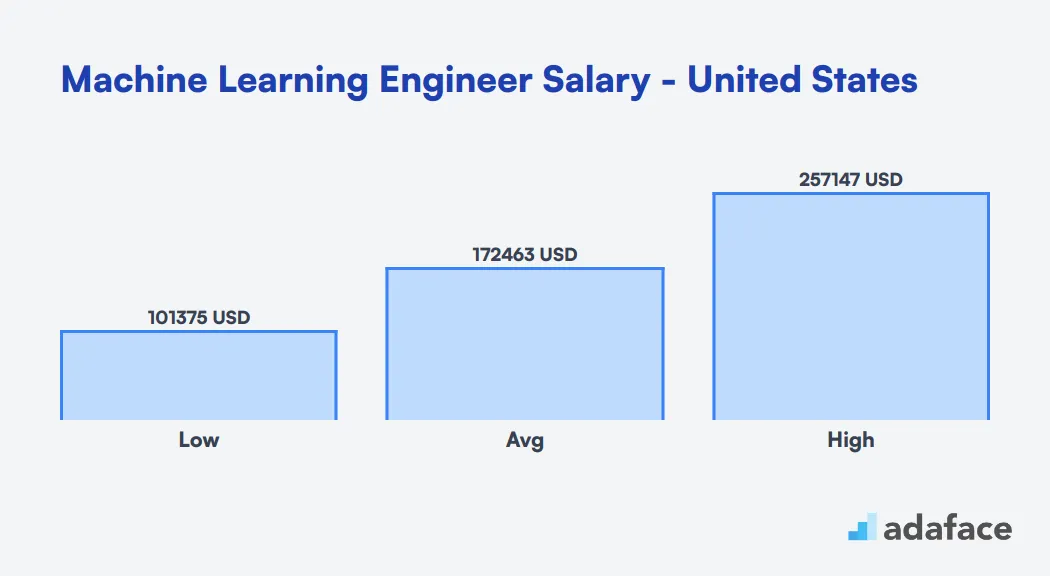
Machine Learning Engineer Salary in the United Kingdom
The average salary for a Machine Learning Engineer in the United Kingdom is approximately £55,000 per year. Entry-level positions may start around £40,000, while experienced professionals can earn up to £90,000 or more, depending on their skills and the company.
Salaries can also vary significantly based on location, with major tech hubs like London typically offering higher compensation compared to other regions. Therefore, understanding the local market is essential for attracting top talent.
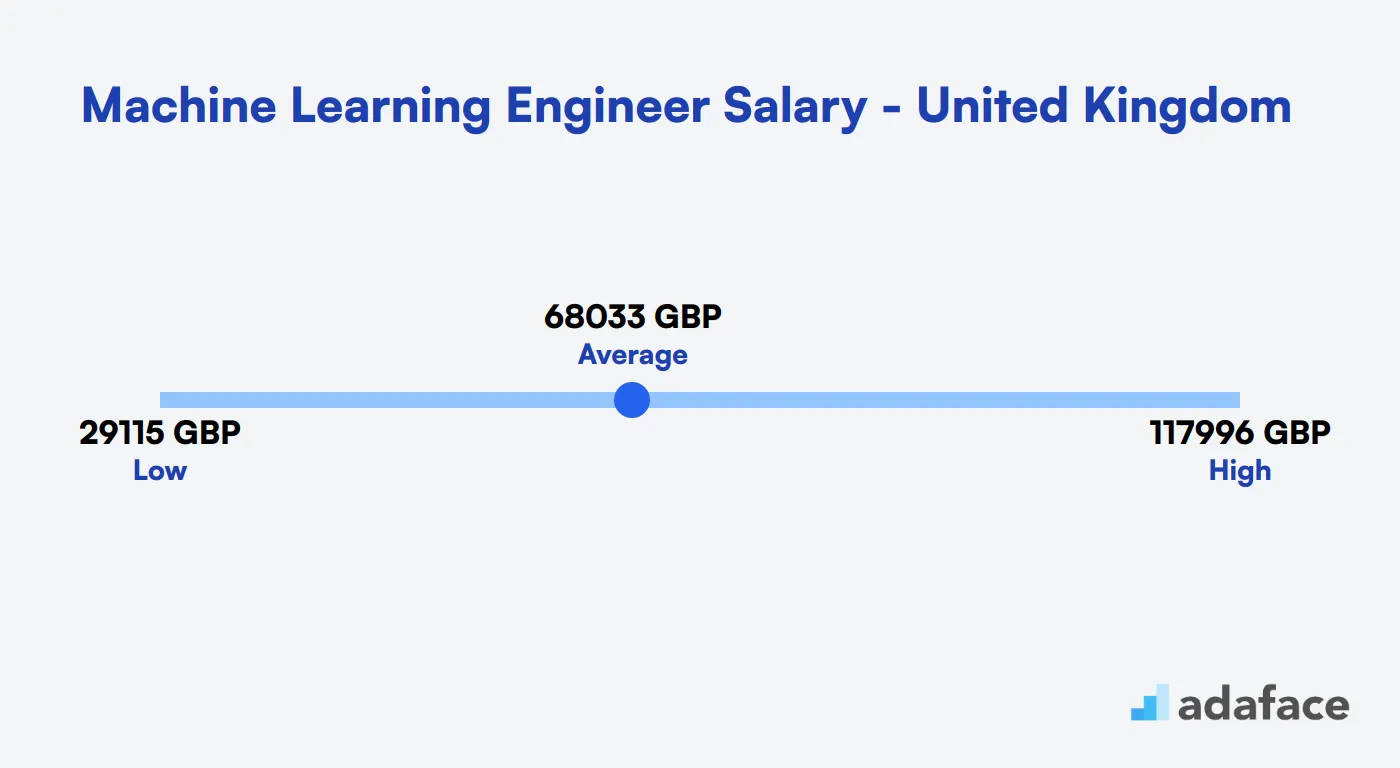
Machine Learning Engineer Salary in Australia
The average salary for a Machine Learning Engineer in Australia is approximately AUD 144,690. Salaries can range from about AUD 86,470 at the lower end to as high as AUD 213,736 for those with significant experience or specialized skills.
In major cities like Sydney, you can expect salaries to be even higher, with an average of around AUD 192,241. Other cities like Melbourne and Brisbane also offer competitive rates with averages of AUD 124,462 and AUD 115,114, respectively.
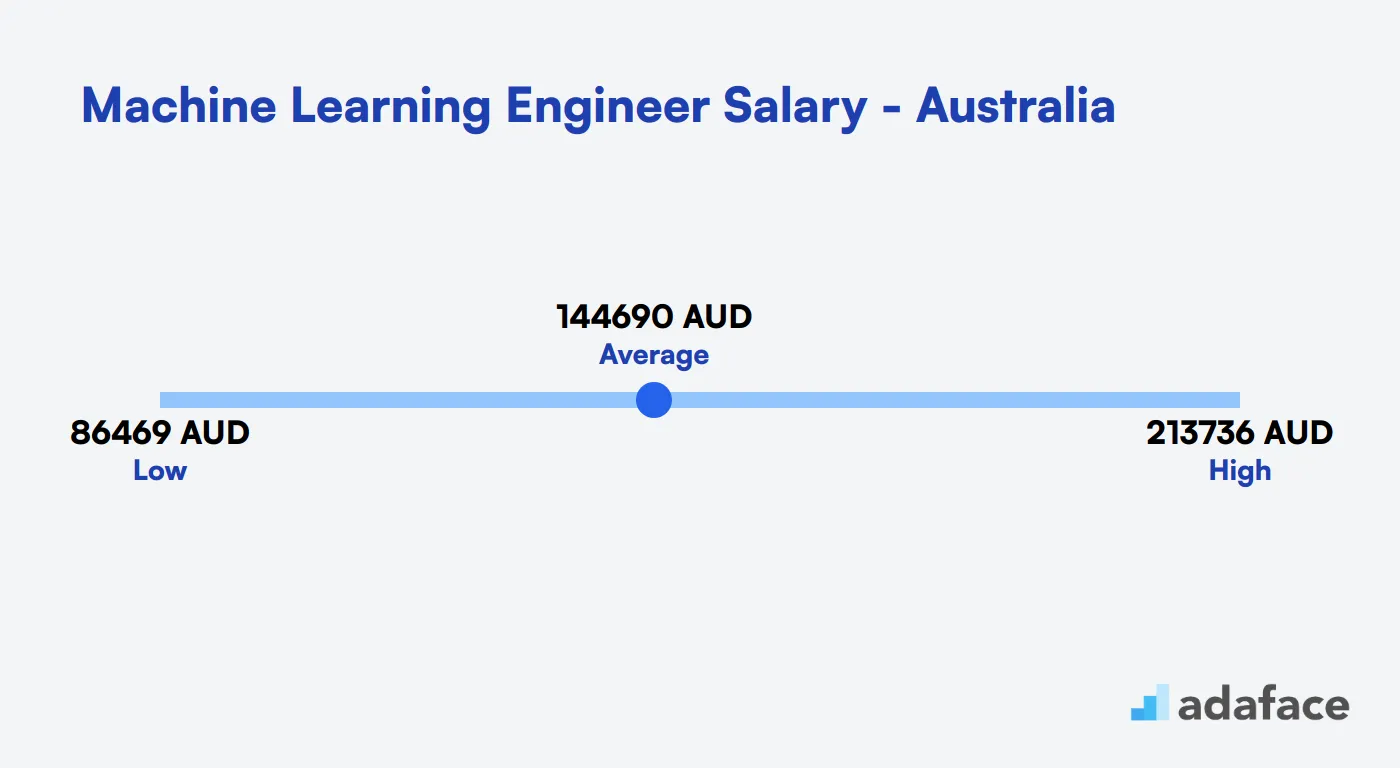
Machine Learning Engineer Salary in Canada
Hiring a Machine Learning Engineer in Canada will typically cost between CAD 72,028 and CAD 189,834 per year. The median salary sits around CAD 116,933, with the average being about CAD 125,597. Location plays a role, with cities like Edmonton and Waterloo offering higher averages, while places like Kelowna and Burnaby tend to be on the lower end of the spectrum.
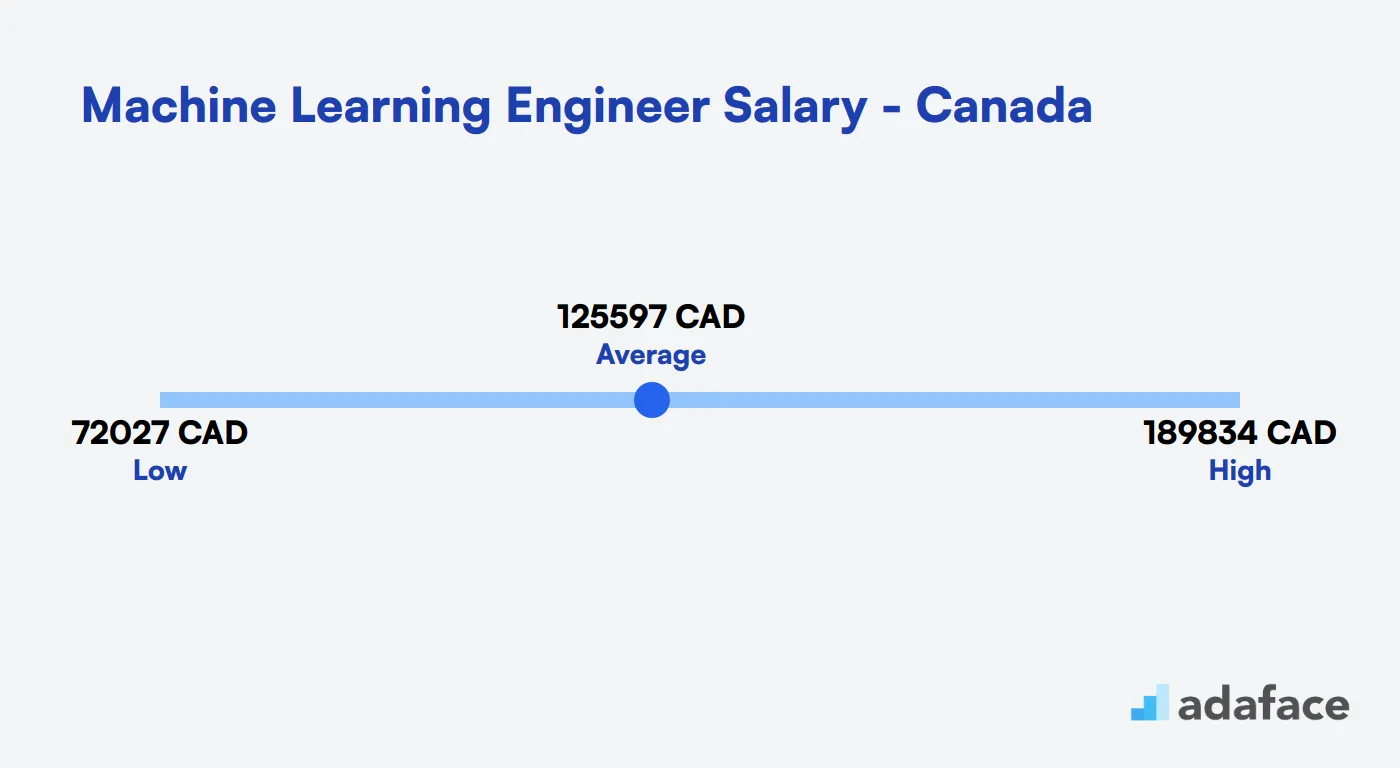
Machine Learning Engineer Salary in India
The salary for Machine Learning Engineers in India varies based on location and experience. In Bengaluru, the tech hub of India, ML Engineers earn an average of ₹14,31,681 per year. Mumbai follows closely with an average of ₹13,47,901 annually.
Across India, the median salary for Machine Learning Engineers is approximately ₹9,50,308 per year. Entry-level positions start around ₹4,75,205, while experienced professionals can earn up to ₹19,00,412 annually.
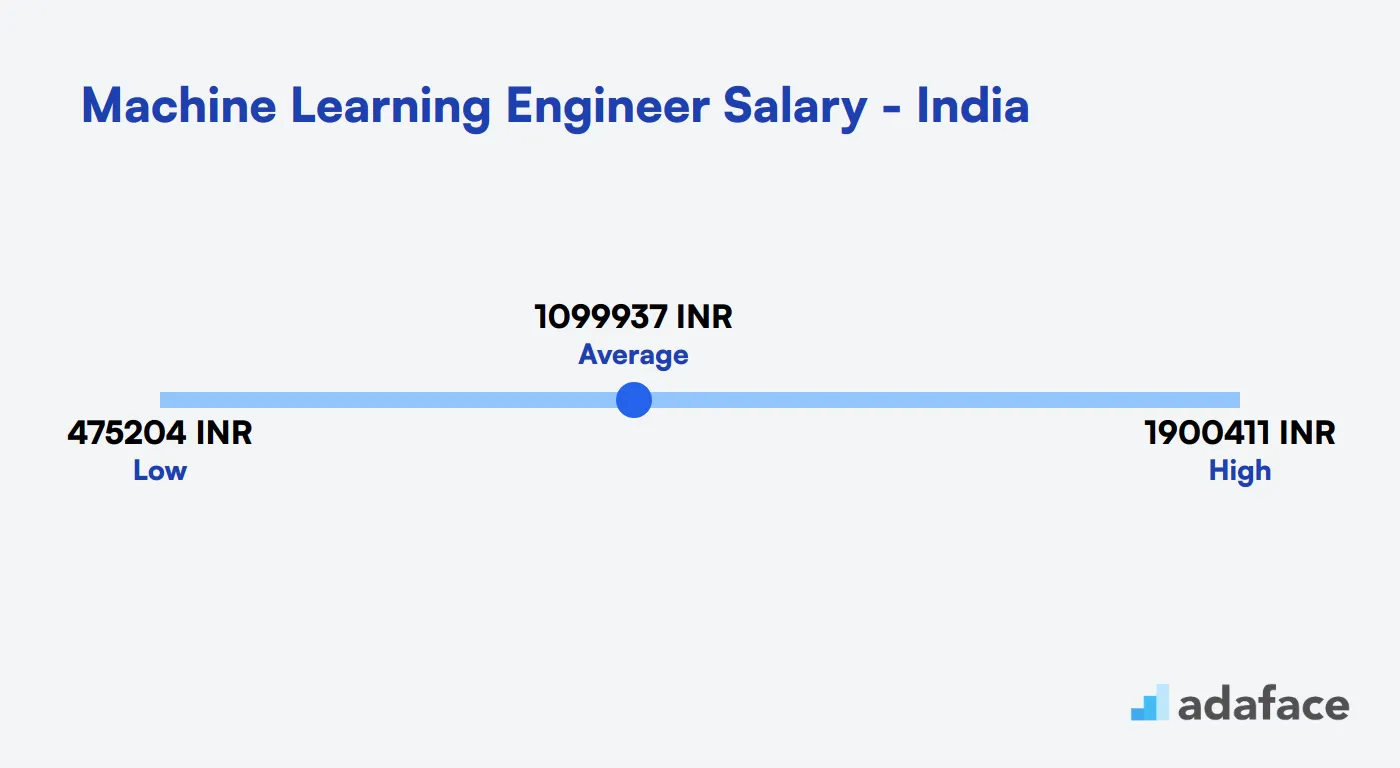
What's the difference between a Machine Learning Engineer and a Data Engineer?
Many people confuse Machine Learning Engineers and Data Engineers due to their overlapping skills in data handling and programming. However, these roles have distinct focuses and responsibilities within the data science ecosystem.
Machine Learning Engineers primarily design and implement ML models. They use languages like Python and R, working with frameworks such as TensorFlow and PyTorch. Their main tasks involve model building and validation.
Data Engineers, on the other hand, focus on developing data infrastructure. They typically use SQL, Java, and Python to create data pipelines. Their core responsibilities include data storage, retrieval, and working with tools like Apache Hadoop and Spark.
While both roles often require a Computer Science degree, their skill emphases differ. Machine Learning Engineers concentrate on algorithms and modeling, whereas Data Engineers specialize in data management and ETL processes.
| Machine Learning Engineer | Data Engineer | |
|---|---|---|
| Primary Focus | Model Development | Data Infrastructure |
| College Degree | Computer Science or related | Computer Science or IT |
| Programming Languages | Python, R | SQL, Java, Python |
| Core Responsibilities | Designing and implementing ML models | Developing data pipelines |
| Tools | TensorFlow, PyTorch, scikit-learn | Apache Hadoop, Apache Spark |
| Data Handling | Model Building and Validation | Data Storage and Retrieval |
| Common Frameworks | Machine Learning Frameworks | Data Warehousing Solutions |
| Skill Emphasis | Algorithms, Modeling | Data Management, ETL |
What are the ranks of Machine Learning Engineers?
Machine Learning Engineers often have varied titles and responsibilities across different organizations. This can make it challenging to distinguish between roles and seniority levels. Here's a breakdown of common ranks for Machine Learning Engineers:
- Junior Machine Learning Engineer: Entry-level position for those with a strong theoretical background but limited practical experience. They typically work on smaller projects or assist senior team members.
- Machine Learning Engineer: Mid-level position for professionals with 2-5 years of experience. They can independently handle projects and contribute to model development and deployment.
- Senior Machine Learning Engineer: Experienced professionals with 5+ years in the field. They lead complex projects, mentor junior team members, and often contribute to strategic decisions.
- Principal Machine Learning Engineer: Top-tier individual contributors with extensive experience. They drive innovation, set technical direction, and often work on cutting-edge research and development.
- Machine Learning Architect: Senior-level position focused on designing large-scale ML systems. They work across teams to ensure integration of ML solutions with existing infrastructure.
- Head of Machine Learning / Chief AI Officer: Executive-level position responsible for overall ML/AI strategy and implementation within the organization. They often collaborate with data scientists and data engineers to drive AI initiatives.
Hire the Best Machine Learning Engineers
Throughout this blog post, we've explored the nuances of hiring machine learning engineers, from understanding their critical role and necessary skills, to crafting a compelling job description and utilizing the right platforms. These insights are designed to help you streamline the recruitment process and identify the most suitable candidates for your organization.
If there's one takeaway, it's the importance of using precise job descriptions and skills assessments to pinpoint talent effectively. Consider leveraging targeted tests like the Machine Learning Online Test to ensure candidates have the requisite technical skills. This approach will help you confidently hire engineers who can drive innovation and success in your projects.
Machine Learning Assessment Test
FAQs
A machine learning engineer is responsible for designing and implementing algorithms that enable machines to learn and improve from experience. They work on model training and deployment, data preprocessing, and integration of machine learning models into existing systems.
Key skills include proficiency in programming languages like Python or R, experience with machine learning frameworks such as TensorFlow or PyTorch, understanding of data structures and algorithms, and strong analytical and problem-solving abilities.
An effective job description should clearly outline the role's responsibilities, required skills, and qualifications. You should also highlight your company's culture and any unique projects the engineer might work on. For examples, see Adaface's job description guide.
Some popular platforms include LinkedIn, Glassdoor, and specialized job boards like Kaggle Jobs and Indeed. These platforms allow you to find candidates with the specific skill sets needed for machine learning roles.
While both roles involve working with data, a data engineer focuses on building and maintaining data pipelines and infrastructure. In contrast, a machine learning engineer applies this data to develop predictive models and algorithms.
To screen resumes effectively, look for relevant experience, specific technical skills, and projects or publications that demonstrate the candidate's ability to apply machine learning concepts in practical scenarios.
Skills tests should assess a candidate's proficiency in machine learning concepts, programming languages, and problem-solving abilities. Consider using platforms like Adaface's coding tests for a comprehensive evaluation.

40 min skill tests.
No trick questions.
Accurate shortlisting.
We make it easy for you to find the best candidates in your pipeline with a 40 min skills test.
Try for freeRelated posts
Free resources



